2023届高三英语二轮复习名词性从句要点课件-(15张ppt)
文档属性
| 名称 | 2023届高三英语二轮复习名词性从句要点课件-(15张ppt) | 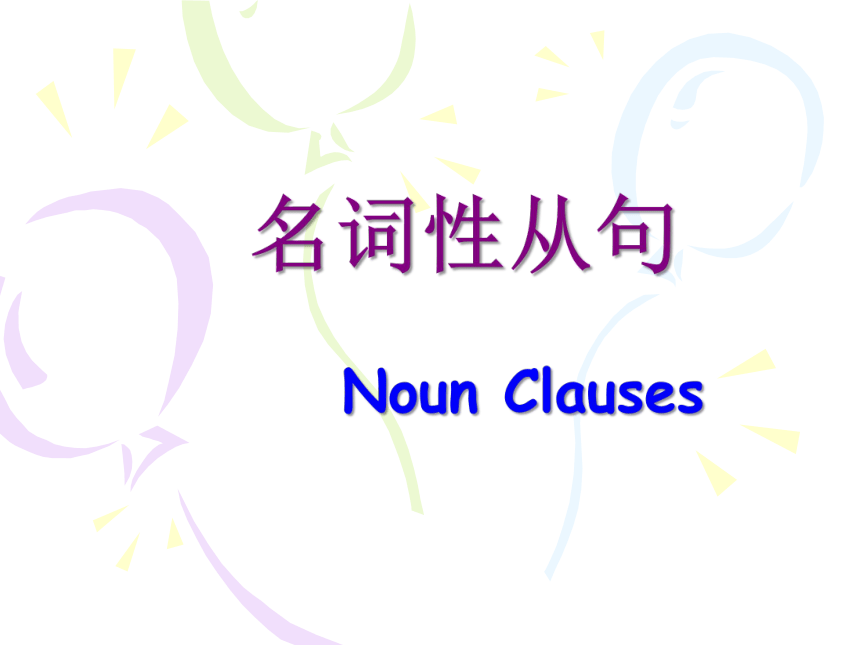 | |
| 格式 | pptx | ||
| 文件大小 | 123.5KB | ||
| 资源类型 | 教案 | ||
| 版本资源 | 通用版 | ||
| 科目 | 英语 | ||
| 更新时间 | 2023-02-09 12:11:45 | ||
图片预览

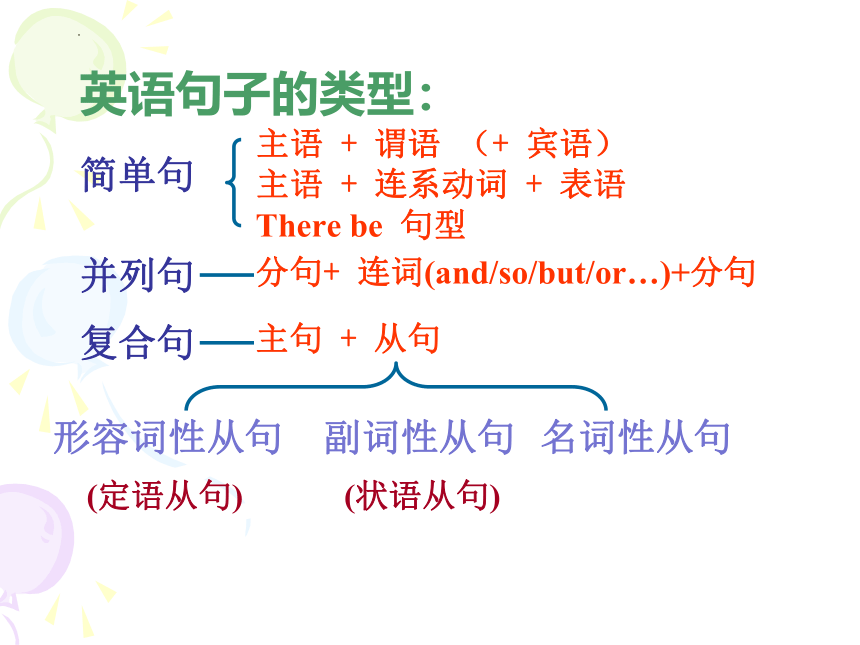
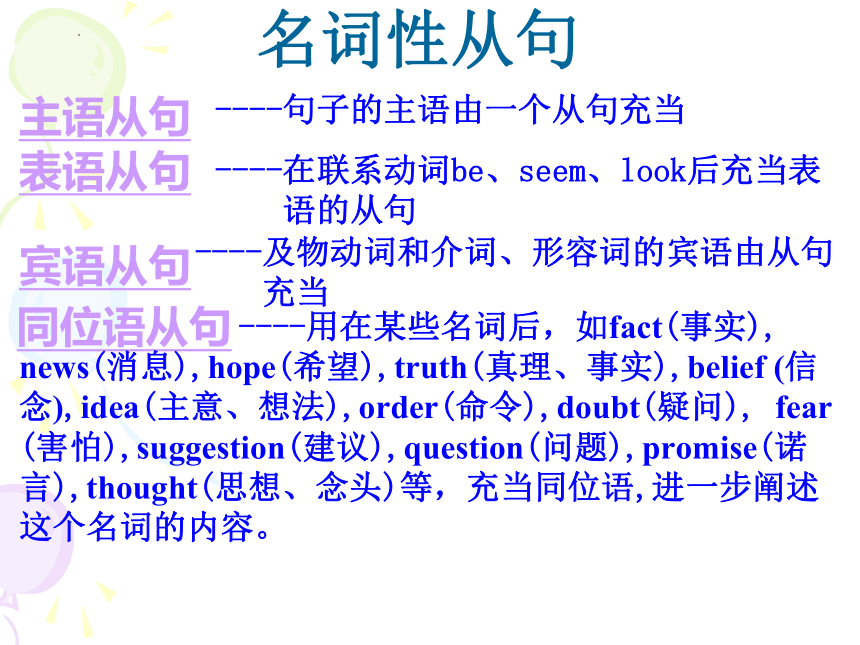
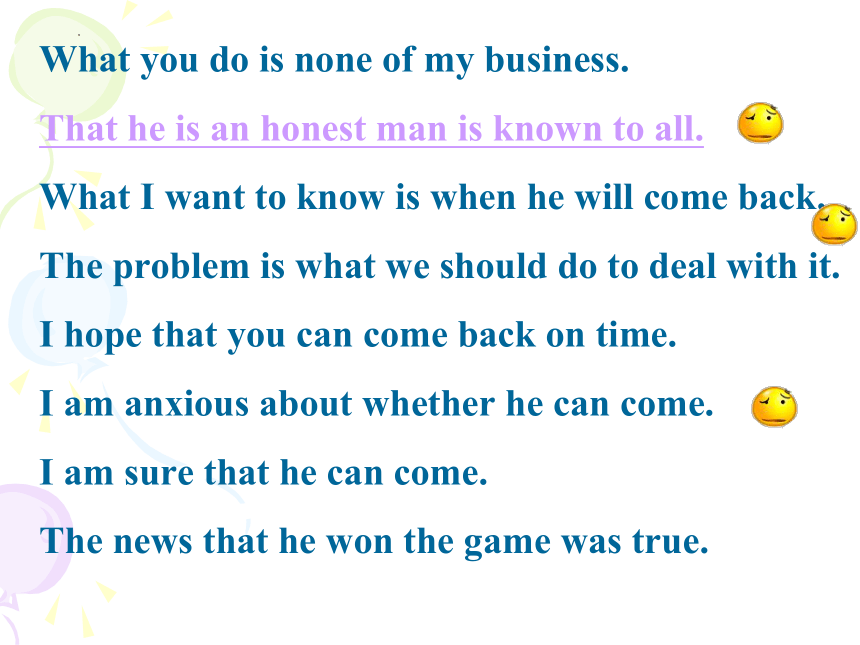
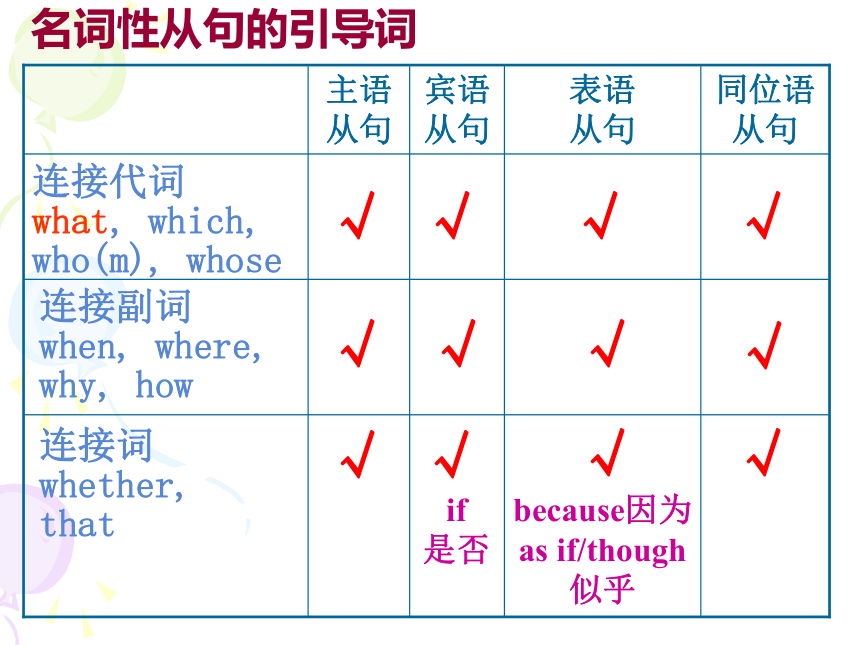
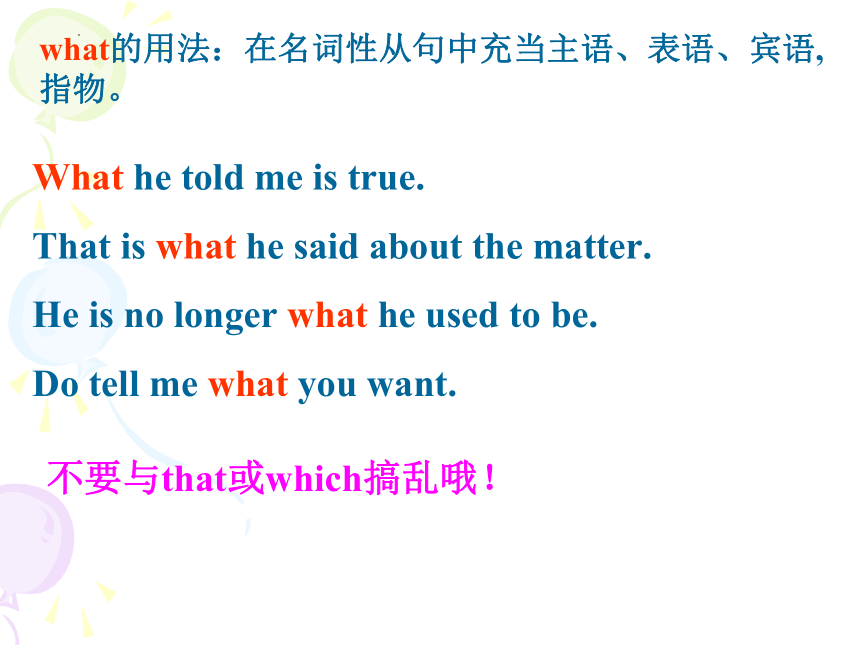
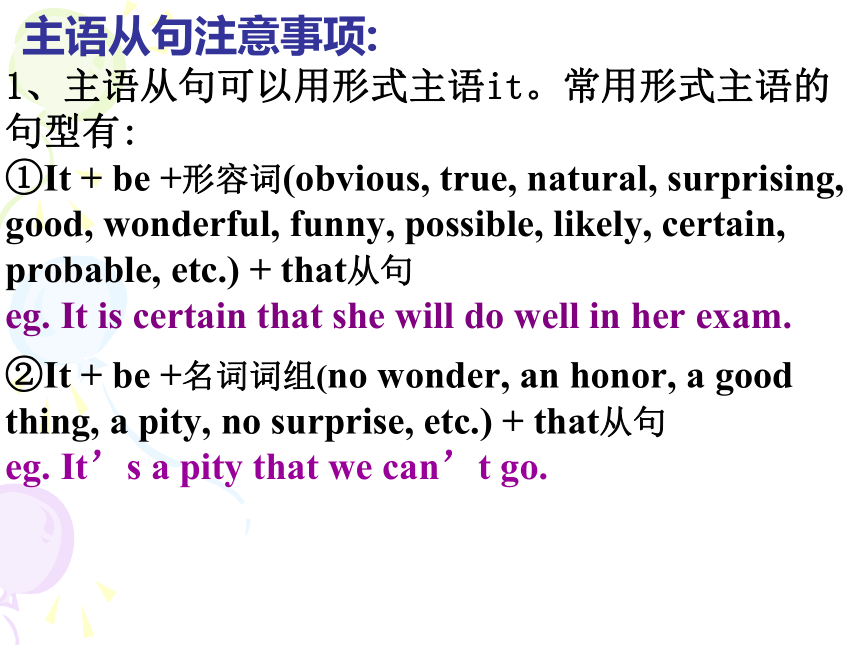
文档简介
(共15张PPT)
名词性从句
Noun Clauses
英语句子的类型:
简单句
主语 + 谓语 (+ 宾语)
主语 + 连系动词 + 表语
There be 句型
并列句
分句+ 连词(and/so/but/or…)+分句
复合句
主句 + 从句
名词性从句
形容词性从句
(定语从句)
副词性从句
(状语从句)
名词性从句
表语从句
主语从句
宾语从句
同位语从句
----句子的主语由一个从句充当
----及物动词和介词、形容词的宾语由从句
充当
----在联系动词be、seem、look后充当表
语的从句
----用在某些名词后,如fact(事实), news(消息),hope(希望),truth(真理、事实),belief (信念),idea(主意、想法),order(命令),doubt(疑问), fear (害怕),suggestion(建议),question(问题),promise(诺言),thought(思想、念头)等,充当同位语,进一步阐述这个名词的内容。
What you do is none of my business.
That he is an honest man is known to all.
What I want to know is when he will come back.
The problem is what we should do to deal with it.
I hope that you can come back on time.
I am anxious about whether he can come.
I am sure that he can come.
The news that he won the game was true.
主语从句 宾语从句 表语 从句 同位语从句
名词性从句的引导词
连接代词
what, which, who(m), whose
连接副词
when, where, why, how
连接词
whether, that
√
√
√
√
√
√
√
√
√
√
√
√
if
是否
because因为
as if/though 似乎
what的用法:在名词性从句中充当主语、表语、宾语,指物。
What he told me is true.
That is what he said about the matter.
He is no longer what he used to be.
Do tell me what you want.
不要与that或which搞乱哦!
主语从句注意事项:
1、主语从句可以用形式主语it。常用形式主语的句型有:
①It + be +形容词(obvious, true, natural, surprising, good, wonderful, funny, possible, likely, certain, probable, etc.) + that从句
eg. It is certain that she will do well in her exam.
②It + be +名词词组(no wonder, an honor, a good thing, a pity, no surprise, etc.) + that从句
eg. It’s a pity that we can’t go.
③It + be +过去分词(announced, arranged, thought, said, decided, expected, reported, etc.) +that从句
eg. It is said that Mr. Green has arrived in Beijing.
④It + seem, happen等不及物动词+that从句
eg. It happened that I was out that day.
1、连接词that在宾语从句中常常可以省略,但
①有两个或多个宾语从句时,引导第二或以下几个从句的that不能省。
eg. Everybody could see what happened and that Tom was frightened.
②that引导的宾语从句作介词宾语时,that不能省。
eg. I know nothing about him except that he is from the south.
宾语从句注意事项:
2、某些形容词或过去分词后常接宾语从句,这类形容词或过去分词有:sure, glad, certain, pleased, happy, afraid, surprised, satisfied等,连词that可省略。
eg. I am not sure what I ought to do.
Mother was very pleased (that) her daughter had passed the exams.
3、如果宾语从句后还有宾语补足语,则用it作形式宾语,而将宾语从句后置。
eg. We thought it strange that Xiao Wang did not come yesterday.
4、连词whether(…or not)或if引导的宾语从句
if和whether引导的宾语从句可以互换使用,但whether常和or not连用,if 则不可以;作介词的宾语只能用whether, 不能用if;当宾语从句是否定句时只能用if。
eg. I wonder whether(不能用if) it is true or not.
Everything depends on whether(不能用if) we have enough experience.
I don’t care if(是否) it doesn’t rain.
5、宾语从句的否定转移
在think, believe, suppose, expect等动词后面的否定的宾语从句,否定词前移到主句。
eg. I don’t think you are right.
He didn’t believe they have finished the work.
6、在think, believe, imagine, suppose, guess, hope等动词以及I’m afraid等后,可用so代替一个肯定的宾语从句,还可以用not 代替一个否定的宾语从句。
eg. Do you think he is right
Yes, I think so.
No, I don’t think so./I think not.
Yes, I believe so./ No, I believe not.
1、主语是reason时,表语从句常用that, 不用because。
eg. The reason for his absence was that he was ill.
The reason why he didn’t come was that he was ill.
表语从句注意事项:
同位语从句注意事项:
注意区分同位语从句和定语从句:
①前者说明名词词组的内容,后者说明名词词组的性质特征。
② 前者中的that在句中不充当任何成分,后者that是从句中的一个成分,表示先行词的意义。
试比较下列句子:
The news that he joined the army is inspiring.
The news that he told me is inspiring.
说明news的具体内容
(作宾语,意义等于news)
(无意义)
(同位语从句)
(定语从句)
修饰、限制news
注意事项:
Whatever, whoever, whichever, whenever等可用名词性从句或状语从句中
而no matter + what / who / which / when 却只能用在状语从句中
Whoever breaks the school rules should be punished.
No matter what happens, I’ll be with you.
√
Whatever happens, I’ll be with you.
√
名词性从句
Noun Clauses
英语句子的类型:
简单句
主语 + 谓语 (+ 宾语)
主语 + 连系动词 + 表语
There be 句型
并列句
分句+ 连词(and/so/but/or…)+分句
复合句
主句 + 从句
名词性从句
形容词性从句
(定语从句)
副词性从句
(状语从句)
名词性从句
表语从句
主语从句
宾语从句
同位语从句
----句子的主语由一个从句充当
----及物动词和介词、形容词的宾语由从句
充当
----在联系动词be、seem、look后充当表
语的从句
----用在某些名词后,如fact(事实), news(消息),hope(希望),truth(真理、事实),belief (信念),idea(主意、想法),order(命令),doubt(疑问), fear (害怕),suggestion(建议),question(问题),promise(诺言),thought(思想、念头)等,充当同位语,进一步阐述这个名词的内容。
What you do is none of my business.
That he is an honest man is known to all.
What I want to know is when he will come back.
The problem is what we should do to deal with it.
I hope that you can come back on time.
I am anxious about whether he can come.
I am sure that he can come.
The news that he won the game was true.
主语从句 宾语从句 表语 从句 同位语从句
名词性从句的引导词
连接代词
what, which, who(m), whose
连接副词
when, where, why, how
连接词
whether, that
√
√
√
√
√
√
√
√
√
√
√
√
if
是否
because因为
as if/though 似乎
what的用法:在名词性从句中充当主语、表语、宾语,指物。
What he told me is true.
That is what he said about the matter.
He is no longer what he used to be.
Do tell me what you want.
不要与that或which搞乱哦!
主语从句注意事项:
1、主语从句可以用形式主语it。常用形式主语的句型有:
①It + be +形容词(obvious, true, natural, surprising, good, wonderful, funny, possible, likely, certain, probable, etc.) + that从句
eg. It is certain that she will do well in her exam.
②It + be +名词词组(no wonder, an honor, a good thing, a pity, no surprise, etc.) + that从句
eg. It’s a pity that we can’t go.
③It + be +过去分词(announced, arranged, thought, said, decided, expected, reported, etc.) +that从句
eg. It is said that Mr. Green has arrived in Beijing.
④It + seem, happen等不及物动词+that从句
eg. It happened that I was out that day.
1、连接词that在宾语从句中常常可以省略,但
①有两个或多个宾语从句时,引导第二或以下几个从句的that不能省。
eg. Everybody could see what happened and that Tom was frightened.
②that引导的宾语从句作介词宾语时,that不能省。
eg. I know nothing about him except that he is from the south.
宾语从句注意事项:
2、某些形容词或过去分词后常接宾语从句,这类形容词或过去分词有:sure, glad, certain, pleased, happy, afraid, surprised, satisfied等,连词that可省略。
eg. I am not sure what I ought to do.
Mother was very pleased (that) her daughter had passed the exams.
3、如果宾语从句后还有宾语补足语,则用it作形式宾语,而将宾语从句后置。
eg. We thought it strange that Xiao Wang did not come yesterday.
4、连词whether(…or not)或if引导的宾语从句
if和whether引导的宾语从句可以互换使用,但whether常和or not连用,if 则不可以;作介词的宾语只能用whether, 不能用if;当宾语从句是否定句时只能用if。
eg. I wonder whether(不能用if) it is true or not.
Everything depends on whether(不能用if) we have enough experience.
I don’t care if(是否) it doesn’t rain.
5、宾语从句的否定转移
在think, believe, suppose, expect等动词后面的否定的宾语从句,否定词前移到主句。
eg. I don’t think you are right.
He didn’t believe they have finished the work.
6、在think, believe, imagine, suppose, guess, hope等动词以及I’m afraid等后,可用so代替一个肯定的宾语从句,还可以用not 代替一个否定的宾语从句。
eg. Do you think he is right
Yes, I think so.
No, I don’t think so./I think not.
Yes, I believe so./ No, I believe not.
1、主语是reason时,表语从句常用that, 不用because。
eg. The reason for his absence was that he was ill.
The reason why he didn’t come was that he was ill.
表语从句注意事项:
同位语从句注意事项:
注意区分同位语从句和定语从句:
①前者说明名词词组的内容,后者说明名词词组的性质特征。
② 前者中的that在句中不充当任何成分,后者that是从句中的一个成分,表示先行词的意义。
试比较下列句子:
The news that he joined the army is inspiring.
The news that he told me is inspiring.
说明news的具体内容
(作宾语,意义等于news)
(无意义)
(同位语从句)
(定语从句)
修饰、限制news
注意事项:
Whatever, whoever, whichever, whenever等可用名词性从句或状语从句中
而no matter + what / who / which / when 却只能用在状语从句中
Whoever breaks the school rules should be punished.
No matter what happens, I’ll be with you.
√
Whatever happens, I’ll be with you.
√
